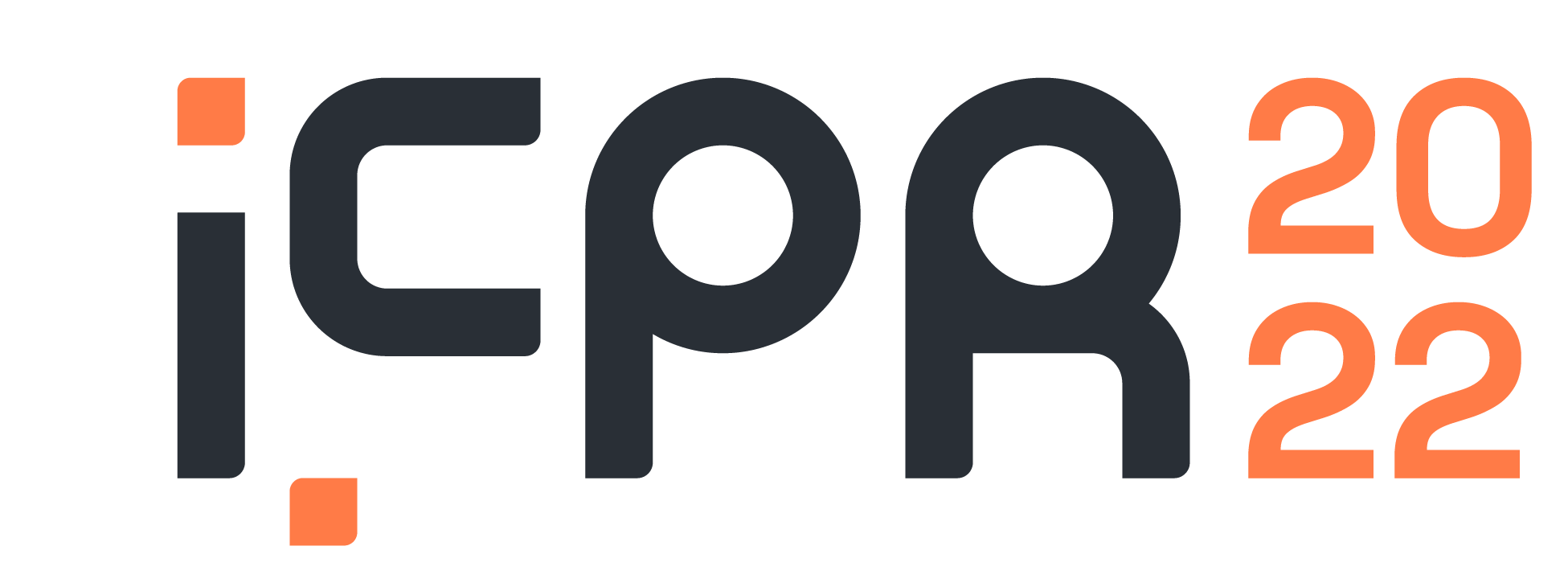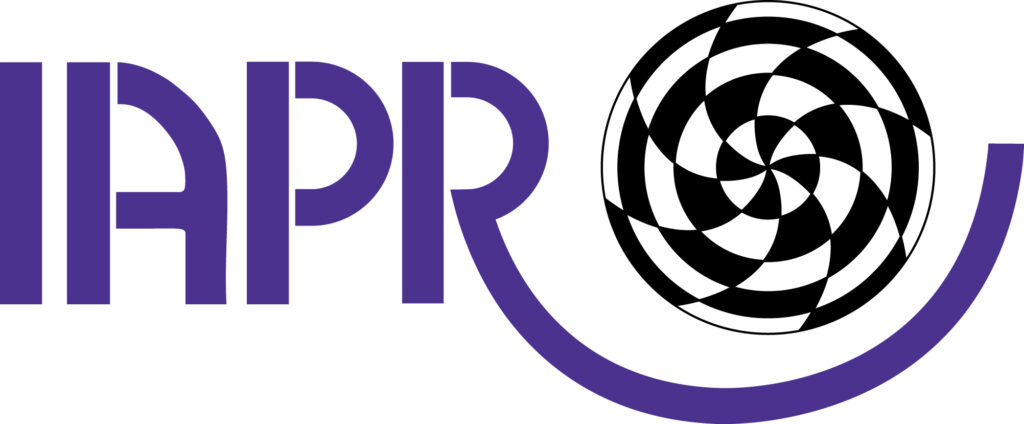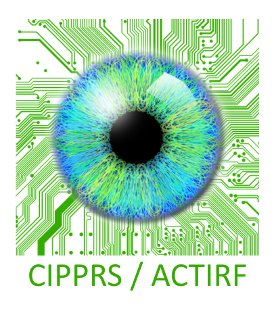All sessions to take place on Sunday, 21 August.
Times shown are in Canadian EDT or GMT-4. Convert to your time zone here.
Workshops
| Title & Description | URL | Type of session | Time |
|---|---|---|---|
| AI4MFDD - ICPR Workshop on Artificial Intelligence for Multimedia Forensics and Disinformation Detection This workshop is intended to disseminate recent development on AI-enabled multimedia forensics and disinformation detection. Multimedia carries not only the value of its content, but also its value in digital forensics for combating crimes and fraudulent activities. With its apparent commercial value, multimedia piracy continues to be an acute issue, especially in the entertainment industry, despite the earnest search for solutions in the past two decades. Deliberate manipulations of multimedia content for malicious purposes have also been a prevailing problem in many walks of life. With the phenomenal leap of artificial intelligence and machine learning (deep learning in particular) in recent years, realistically forged multimedia is appearing as disinformation and fake news that are impacting on social justice at the personal level and major political campaigns and national security at the national level, as well as affecting the stability of international relationships at the global level. In light of the afore-mentioned issues, this proposed workshop is of great interest to the community and beyond. | Take me there! | Virtual | 9am-5pm |
| AI4D - AI for De-escalation: Autonomous Systems for De-escalating Conflict in Military and Civilian Contexts This workshop seeks to address ethical, technical and policy questions related to the deployment of autonomous systems in security and law enforcement roles. | Take me there! | In-person | 9am-5pm |
| AIHA - 2nd International Workshop on Artificial Intelligence for Healthcare Applications The purpose of this workshop is to present recent advances in artificial intelligence techniques for healthcare applications. | Take me there! | Virtual | 9am-1pm |
| AMAR - 3rd Workshop on Applied Multimodal Affect Recognition This workshop addresses the ethical use of novel applications of affective computing in real world scenarios. More specifically, it discusses topics including, but not limited to, privacy, manipulation of users, and public fears and misconceptions regarding affective computing. | Take me there! | Virtual | 9am-1pm |
| CVAUI - 5th Workshop on Computer Vision for Analysis of Underwater Imagery The analysis of underwater imagery imposes a series of unique challenges, which need to be tackled by the computer vision community in collaboration with biologists and ocean scientists. We invite submissions from all areas of computer vision and image analysis relevant for, or applied to, underwater image analysis. | Take me there! | In-person | 9am-5pm |
| DLVDR - Deep Learning for Visual Detection and Recognition This workshop focusses on visual analysis especially detection and recognition, which focuses on localizing and classifying visual patterns involved in various data. | Take me there! | Virtual | 9am-1pm |
| FAIRBIO - ICPR 2022 Workshop Proposal on Fairness in Biometric Systems Biometric systems spread worldwide and are increasingly involved in critical decision-making processes, such as in finance, public security, and forensics. This workshop explores the social, ethical and regulatory issues associated with such systems. | Take me there! | Virtual | 9am-1pm |
| FOREST2022 - Image analysis for forest environmental monitoring Forests are key resources for sustaining life on earth. This workshop covers large- and mid-scale monitoring of forest environments through remote sensing and airborne or land-based sensor analysis. | Take me there! | In-person | 9am-5pm |
| HBU - 12th Int. Workshop on Human Behavior Understanding This workshop will gather researchers dealing with the problem of modeling human behavior under its multiple facets (expression of emotions, display of relational attitudes, performance of individual or joint actions, etc.), with particular attention to clinical settings and tools usable for behavioral scientists. | Take me there! | Virtual | 9am-5pm |
| IML - 2nd International Workshop on Industrial Machine Learning This workshop will draw the attention to the importance of integrating ML technologies and ML-based solutions into the manufacturing domain, while addressing the challenges and barriers to meet the specific needs of this sector. Workshop participants will have the chance to discuss: needs and barriers for ML in manufacturing, state-of-the-art in ML applications to manufacturing, and future research opportunities in this domain. | Take me there! | In-person | 9am-1pm |
| IMTA - 8th International Workshop “Image Mining. Theory and Applications” The main purpose of the Workshop "Image Mining. Theory and Applications" (IMTA-VIII) is to provide the fusion of modern mathematical approaches and techniques for image analysis/pattern recognition with the requests of applications using an image as initial data representation. | Take me there! | Virtual | 9am-5pm |
| MANPU - The 5th International Workshop on coMics ANalysis, Processing and Understanding The MANPU workshop targets researchers in image processing, image analysis, pattern recognition and even knowledge representation as applied to comics. | Take me there! | In-person | 9am-5pm |
| MDMDR - Multimodal Data for Mental Disorder Recognition The MDMDR workshop aims to capture the recent advances in multimedia technology for mental disorder recognition and help to realize timely diagnosis of mental disorders, thereby protecting the mental health of the public. We provide a multi-modal open dataset for mental disorder recognition, mainly collected from clinically depressed patients and matching normal controls. | Take me there! | In-person | 2pm-5pm |
| MMForWILD - Workshop on MultiMedia FORensics in the WILD MMForWILD offers a forum for proposing multimedia forensic solutions meeting the operational needs of forensics and intelligence operators. The workshop is targeted both at researchers working on innovative multimedia technology and experts developing tools in the field. | Take me there! | Virtual | 9am-1pm |
| MPRSS - 7th IAPR Workshop on Multimodal pattern recognition for social signal processing in human computer interaction This workshop mainly focuses on pattern recognition, machine learning, and information fusion methods for the perception of the user’s affective state, activities, and intentions. MPRSS 2022 is a workshop organized by the IAPR Technical Committee 9 on Pattern Recognition in Human-Machine-Interaction. | Take me there! | Virtual | 9am-1pm |
| PatReCH 2022 - III International Workshop on Pattern Recognition for Cultural Heritage The aim of this workshop is to present recent advances in Pattern Recognition and Artificial Intelligence techniques for data analysis and representation in the cultural heritage field. Bringing together the work of many experts in this multidisciplinary subject to highlight these advances from a wide-angle perspective, as well as to stimulate new theoretical and applied research for better characterizing the state of the art in this subject. | Take me there! | Virtual | 9am-1pm |
| PRHA - ICPR 2022 Workshop on Pattern Recognition in Healthcare Analytics Healthcare analytics is an interdisciplinary domain aiming to assist physicians using computational techniques and digital health data. Analyzing a vast amount of patient data is vital to infer the characteristics of a patient cohort. Pattern recognition offers essential tools for a wide variety of healthcare tasks, such as medical image processing and classification, risk prediction, disease progression, patient subtyping, and medical text classification. The goal of the proposed workshop is to present some of the latest developments in pattern recognition for healthcare analytics. PRRS Pattern Recognition in Remote Sensing Workshop brings together researchers from both pattern recognition and remote sensing, with emphasis on the application of pattern recognition methods to remotely sensed data. This workshop provide al forum for spreading and exchanging the latest experiences of international researchers in this area. | Take me there! | Virtual | 9am-1pm |
| PRRS - 12th Workshop on Pattern Recognition in Remote Sensing Pattern Recognition in Remote Sensing Workshop brings together researchers from both pattern recognition and remote sensing, with emphasis on the application of pattern recognition methods to remotely sensed data. | Take me there! | In-person | 9am-5pm |
| RRPR - Fourth Workshop on Reproducible Research in Pattern Recognition RRPR 2022 is intended as both a short participative course on Reproducible Research (RR) aspects, leading to open discussions with the participants, and also as a practical workshop on how to actually perform RR. | Take me there! | In-person | 9am-1pm |
| SSL - Theories, Applications, and Cross Modality for Self-Supervised Learning Models Self-supervised learning has recently seen remarkable process across various domains. The goal of SSL method is to learn useful semantic features without any human annotations.This workshop aims to approach the answers from both a theoretical view and practical perspective. | Take me there! | Virtual | 9am-1pm |
| T-CAP - Towards a Complete Analysis of People: From Face and Body to Clothes Human-centered data are extremely widespread and have been intensely investigated by researchers belonging to even very different fields, including Computer Vision, Pattern Recognition, and Artificial Intelligence. The goal of this workshop is to gather research efforts in the field of human analysis, aiming at improving the communication between researchers and companies, and developing novel ideas that can shape the future of this area, in terms of motivations, methodologies, prospective trends, ethics, and potential industrial applications. | Take me there! | Virtual | 9am-1pm |
| UMDBB - Understanding and Mitigating Demographic Bias in Biometric Systems Biometrics is a widely adopted technology for recognizing identities, surveillance, border control, and mobile user authentication. This workshop addresses issues related to bias in these datasets and systems and investigates mechanisms to mitigate this issue. | Take me there! | Virtual | 9am-5pm |
| VAIB22 - Visual observation and analysis of Vertebrate And Insect Behavior There has been an enormous amount of research on analysis of video data of humans, but relatively little on visual analysis of other organisms. The goal of this workshop is to stimulate and bring together the current research in this area, and provide a forum for researchers to share expertise. | Take me there! | Virtual | 9am-1pm |
| XAIE - 2-nd Workshop on Explainable and Ethical AI This workshop aims to address technical aspects of explainable and ethical AI in general, and include related applications and case studies with the aim to address this very important problems from a broad technical perspective. | Take me there! | In-person | 9am-1pm |
Tutorials
| Title & Description | URL | Type of session | Time |
|---|---|---|---|
| Interactive Art and Pattern Recognition In the last decade, the art and theater worlds have increasingly endeavored to create interactive experiences for their audiences by using cameras and other sensors combined with modern recognition techniques. In this tutorial we discuss interactive methodologies from video, audio, biometrics, and machine learning. We show a sampling of interactive art starting with Experiments in Art and Technology in New York in the 1960s, up to present day. | Take me there! | In-Person | 2pm-5pm |
| Target Class Learning for Anomaly/Outlier Detection: a robust strategy Machine learning techniques have advanced exponentially in recent years. These improved technologies are adopted in several application domains. An anomaly is an abnormal pattern that exists in the data and in all real-time applications, anomaly detection is the most crucial task. The anomaly or outlier detection task becomes more challenging when only the target class (class of interest) samples are available during training and other class samples are either ill-defined or absent. In this context, several solutions have been offered, but despite the extensive technological developments, anomaly/novelty detection is still a challenging task and there is enough scope to mimic the learning behaviour of the human brain. Following the capability of the brain to simultaneously analyze the anomaly, one-class classification strategies are adopted for better learning of the target class. Apart from the huge sample space, the high dimension of the data adds computational overhead along with its intrinsic property of curse of dimensionality. The learning models exhibit better performance in the presence of the most promising training samples and discriminating features. The selection of training samples and features must be supervised by only the target class samples to ensure strong separation from outliers. With this motivation, this tutorial presents the recent advancements in target class learning for anomaly detection while covering fundamentals, use-cases, applications, and challenges. The tutorial also discusses future research possibilities and necessary challenges. | Take me there! | Virtual | 9am-1pm |
| General Adaptive Neighborhood Image Processing and Analysis (GANIPA) The framework entitled General Adaptive Neighborhood Image Processing and Analysis (GANIPA) has been introduced in order to propose an original local image representation and mathematical structure for adaptive non-linear processing and analysis of gray-tone images and further extended to color and multispectral images. The central idea is based on the key notion of adaptivity which is simultaneously associated with the analyzing scales, the spatial structures and the intensity values of the image to be addressed. Several adaptive image operators are then defined in the context of image filtering, image segmentation, image measurements and image registration by the use of convolution analysis, order filtering, mathematical morphology, integral geometrical or similarity measures. Such operators are no longer spatially invariant, but vary over the whole image with General Adaptive Neighborhoods (GANs) as adaptive operational windows, taking intrinsically into account the local image features. The first part of this tutorial will be focused on the context and the definitions and properties of the GANs. Once these adaptive neighborhoods are defined, it is possible to build different operators for image processing (filtering such as enhancement/restoration, segmentation, registration...) but also for image analysis providing tools for local image measurements (for shape analysis, object detection, image classification). The second part of my talk will be focused on these new operators and will be illustrated on real applications in different areas (biomedical, material, process engineering, remote sensing...). Finally, some conclusions and prospects will be given. In conclusion, the GANIPA framework allows efficient adaptive image operators to be built (using local adaptive operational windows) and opens new pathways that promise large prospects for image and pattern analysis. | Take me there! | In-Person | 9am-1pm |
| Deep Learning Models for Weakly-Supervised Object Localization and Segmentation Deep learning models, and in particular CNNs, provide state-of-the-art performance in many visual recognition applications, such as image classification, object localization and detection, and segmentation. However, they remain complex models with millions of parameters that typically require supervised end-to-end training on large annotated datasets. Weakly supervised learning (WSL) has recently emerged as an appealing approach to mitigate the cost and burden of annotating large datasets, by exploiting data with limited or coarse labels. In particular, WSL is largely beneficial in object localization and semantic segmentation tasks, to avoid the costly process of extracting bounding boxes and dense pixel-wise annotations. Weakly-supervised object localization (WSOL) and weakly-supervised semantic segmentation (WSSS) methods have drawn much attention because they rely on less costly annotation such as image-class labels. This tutorial provides a detailed review of the recent progress with deep WSOL/WSSS models, and their applications in pattern recognition and computer vision. The tutorial will cover the fundamental principles, recent trends and developments, key challenges, and insights on these powerful models. In addition, the tutorial is accompanied by various examples where deep WSOL/WSSS models are applied to solve real-world problems in, e.g, visual recognition and medical image analysis. | Take me there! | In-Person | 9am-1pm |
| Few-Shot Learning Deep learning models are dominating pattern recognition, machine learning and computer vision, and have achieved human leve performances in various tasks, such as image classification. The success and unprecedented performances of state-of-theart learning models are often achieved via training on large-scale labeled data sets. Nevertheless, current models still have difficulty generalizing to novel tasks (e.g., new image classes) unseen during training, given only a few labeled instances for these new tasks. In contrast, humans can learn new tasks easily from a few examples, by leveraging prior experience and related context. Few-shot learning has emerged as an appealing paradigm to bridge this gap. In a few-shot learning setting, a model is first trained on substantial labeled data over an initial task, a process often referred to as base training. Then, supervision for new tasks, which are unseen during base training, is limited to just one or few labeled examples per task. Few-shot learning has recently triggered substantial research efforts and interests, with large numbers of publications within the machine learning, computer vision and pattern recognition communities. For instance, meta-learning or “learning-to-learn” approaches, which create artificial few-shot tasks during training to mimic generalization difficulties, have attracted widespread attention within the community. This tutorial discusses the recent progress made in few-shot learning, juxtaposing meta-learning and advanced transfer-learning approaches. It will also discuss various applications of few-shot learning in pattern recognition and computer vision. We will emphasize recent trends and insights from the literature, and point to important limitations in current few-shot models and benchmarks. We will focus on basic understanding of few-shot concepts and models so that tutorial attendees, without prior experience in few-shot learning, could extend/use effectively few-shot methods and publicly available code. | Take me there! | In-Person | 2pm-5pm |
| Visual Fusion for Pattern Recognition Many pattern recognition tasks, whether carried out by humans or machines are facilitated by the use of multimodal sensing (e.g. RGB, infrared, thermal, depth, hyperspectral, LIDAR) which provides complementary information about the objects or phenomena to be classified by measuring their different properties. However, this raises the problem of fusing the multiple sources of information (views). The problem has been addressed by research in image fusion. The aim of this tutorial is to provide an overview of the visual information fusion area, covering: a) Problem formulation and prerequisites, b) Visual fusion frameworks, c) Image fusion techniques. The use of the fusion techniques described will be illustrated on different applications, including visual object tracking. | Take me there! | Virtual | 9am-1pm |





